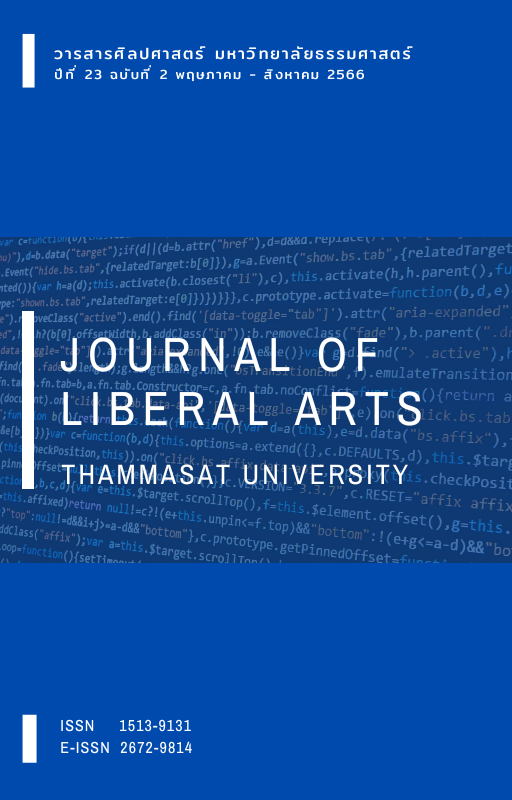บทบาทและอิทธิพลของแนวคิดรัฐวินัยในฐานะเครื่องมือทางการเมืองของระบอบอำนาจนิยมในรัสเซีย : กรณีศึกษา การเมืองการปกครองในลัทธิปูติน
Main Article Content
บทคัดย่อ
บทความวิจัยนี้มีจุดประสงค์เพื่อศึกษาแนวคิดรัฐวินัยที่ประกอบไปด้วยเครื่องมือสำคัญ 3 ประการคือ อัตตาธิปไตย ออร์โธดอกซ์ และชาตินิยม ที่ส่งผลกระทบต่อโครงสร้างทางการเมืองการปกครองและสังคมของรัสเซียในสมัยจักรวรรดิให้กลายเป็นระบอบอำนาจนิยมภายใต้ระบอบสมบูรณาญาสิทธิราชย์ เพื่อสร้างความมั่นคงให้แก่อำนาจรัฐแบบผูกขาดผ่านผู้นำที่ใช้อำนาจเบ็ดเสร็จในการขับเคลื่อนจักรวรรดิรัสเซีย แนวคิดดังกล่าวได้ถูกนำมาใช้เป็นต้นแบบของกลไก “รัฐวินัยใหม่” ในรัสเซียยุคใหม่ภายใต้การปกครองลัทธิปูติน เพื่อสร้างเสถียรภาพในอำนาจของผู้นำ ผลการศึกษาพบว่า แนวคิดรัฐวินัยเป็นกลไกสำคัญที่ทำให้เกิดความมั่นคงในโครงสร้างทางสังคมเพื่อสร้างเสถียรภาพในการปกครองประเทศ ทำให้เกิดการรวมศูนย์อำนาจไว้ที่ตัวผู้นำจนสามารถควบคุมทุกองค์ประกอบในการขับเคลื่อนประเทศได้อย่างมั่นคง ความสำเร็จของแนวคิดรัฐวินัยมีอิทธิพลต่อการสร้างลัทธิปูตินในรัสเซียสมัยใหม่ที่เน้นการปกครองประเทศด้วยระบอบอำนาจนิยม ซึ่งสอดคล้องกับอัตลักษณ์ด้านดินแดนและพหุวัฒนธรรมของรัสเซีย การปกครองแบบรวมศูนย์อำนาจสร้างความแข็งแกร่งให้กับรัสเซียยุคใหม่ที่ต้องเผชิญกับภัยคุกคาม ความมั่นคงที่เกิดขึ้นในดินแดนที่เคยเป็นบริวารของอดีตสหภาพโซเวียต นับเป็นกลไกที่ทำให้รัสเซียสามารถรักษาความเป็นมหาอำนาจของตนในปัจจุบันและอนาคต
Downloads
Article Details

อนุญาตภายใต้เงื่อนไข Creative Commons Attribution-NonCommercial-NoDerivatives 4.0 International License.
เอกสารอ้างอิง
กิตติพัฒน์ สุวรรณสิริเมธี. (2550). ปรัชญาการเมืองตะวันตก. มหาวิทยาลัยมหาจุฬาลงกรณราชวิทยาลัย. https://www.mcu.ac.th/article/detail/14242
โกวิท วงศ์สุรวัฒน์. (2550). การเมืองการปกครองรัสเซีย. วาสนา.
นิธิ เอียวศรีวงศ์. (6 มิถุนายน 2562). อัตตาธิปไตยและอาญาสิทธิ์นิยม. ประชาไท.https://prachatai.com/journal/2019/06/82836
เบเนดิกท์ แอนเดอร์สัน. (2557). ชุมชนจินตกรรม : บทสะท้อนว่าด้วยกำเนิดและการแพร่ขยายของชาตินิยม. มูลนิธิโครงการตำราสังคมศาสตร์และมนุษยศาสตร์.
สุปราณี มุขวิชิต. (2536). ประวัติศาสตร์รุสเซียยุคโบราณ จนถึงปี ค.ศ. 1917. โอเดียนสโตร์.
อนันต์ชัย เลาหะพันธ์ และ สัญชัย สุวังบุตร. (2565). รัสเซียสมัยซาร์และสังคมนิยม. แสงดาว.
Andrew, E. (2011). Jean Bodin on Sovereignty. Republics of Letters: A Journal for the Study of Knowledge, Politics, and the Arts, 2(2), 1-10.
Billig, M. (2014). Kurt Lewin's Leadership Studies and His Legacy to Social Psychology: There Nothing as Practical as a Good Theory?. Journal for The Theory of Social Behavior, 45(4), 440-460. https://doi.org/10.1111/jtsb.12074
Blakemore, E. (2017, December 13). How native Americans taught both assimilation and resistance at Indian schools. JSTOR Daily. https://daily.jstor.org/how-native-americans-taught-both-assimilation-and-resistance-at-indian-schools/
Bragg, M. (2007, October 11). The Divine Right of Kings. BBC. https://www.bbc.co.uk/programmes/b0080xph
Clover, C. (2017, October 13). The return of Russian nationalism. Financial Times. https://www.ft.com/content/edb595d8-aeba-11e7-beba-5521c713abf4
Eliassen, M. (2022). Imperial Russia. Study. https://study.com/learn/lesson/imperial-russia-social-structure-classes-culture.html
Figgis, J. N. (1970). The Devine Right of Kings. Cambridge University Press.
Horowitz, J. (2022, May 21). The Russian orthodox leader at the core of Putin’s ambitions. The New York Times. https://www.nytimes.com/2022/05/21/world/europe/kirill-putin-russian-orthodox-church.html
Kelemen, R. Daniel (2017). Europe's other democratic deficit: National authoritarianism in Europe's democratic union. Cambridge University Press.
Kottasova, I. & Chernova, A. (2022, December 5). Putin signs expanded anti-LGBTQ laws in Russia, in latest crackdown on rights. CNN. https://edition.cnn.com/2022/12/05/europe/russia-lgbtq-propaganda-law-signed-by-putin-intl/index.html
Manaev, G. (2019, November 5). Why was the Russian Tsar considered an emissary of God. Russia Beyond. https://www.rbth.com/history/331232-russian-tsar-emissary-of-god
Noble, B. (2020, July 2). Analysis: Vladimir Putin secures constitutional changes allowing him to rule until 2036. University College London. https://www.ucl.ac.uk/news/2020/jul/analysis-vladimir-putin-secures-constitutional-changes-allowing-him-rule-until-2036
Rumer, E. (2019, June 1). The Primakov (Not Gerasimov) Doctrine in Action. JSTOR. https://www.jstor.org/stable/resrep20980.1
Tognini, G. & Hyatt, J. (2022, April 7). The Forbes Ultimate Guide to Russian Oligarchs. Forbes. https://www.forbes.com/sites/giacomotognini/2022/04/07/the-forbes-ultimate-guide-to-russian-oligarchs/?sh=676d31ea276d
Weeks, T. R. (2010, December 3). Russification / Sovietization. European History Online (EGO). http://www.ieg-ego.eu/weekst-2010-en
Zakaria, F. (2014, July 31). The Rise of Putinism. The Washington Post. https://www.washingtonpost.com/opinions/fareed-zakaria-the-rise-of-putinism/2014/07/31/2c9711d6-18e7-11e4-9e3b-7f2f110c6265_story.html


